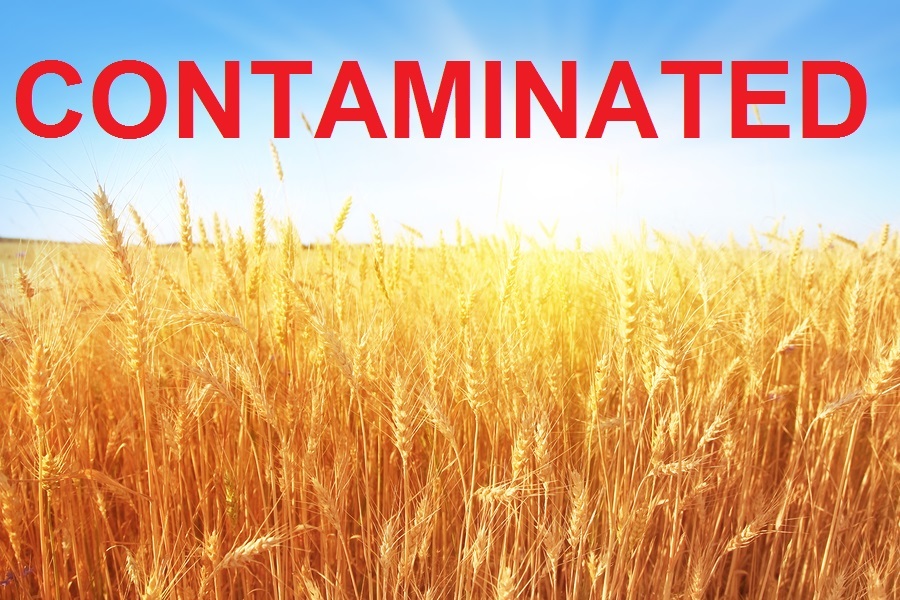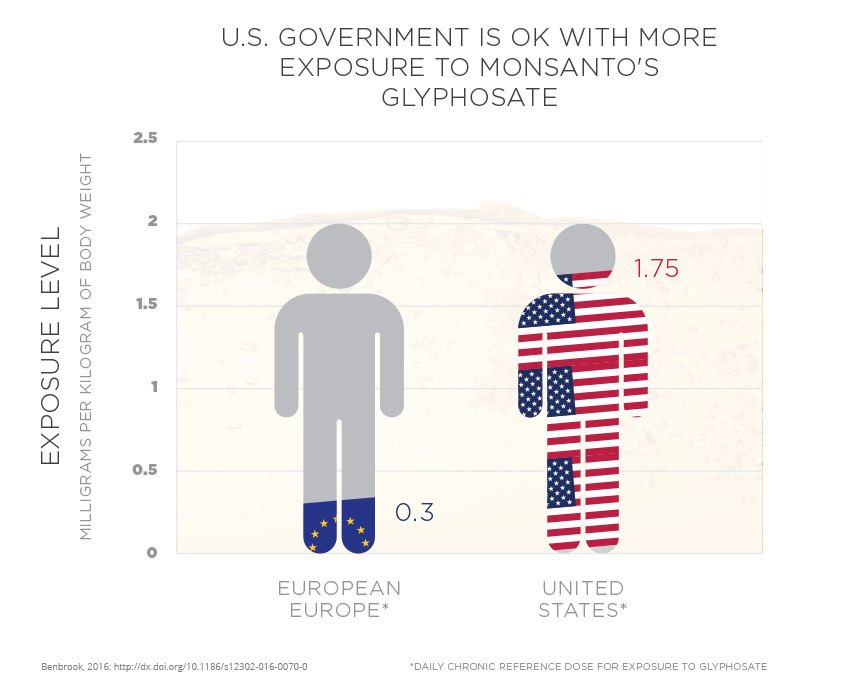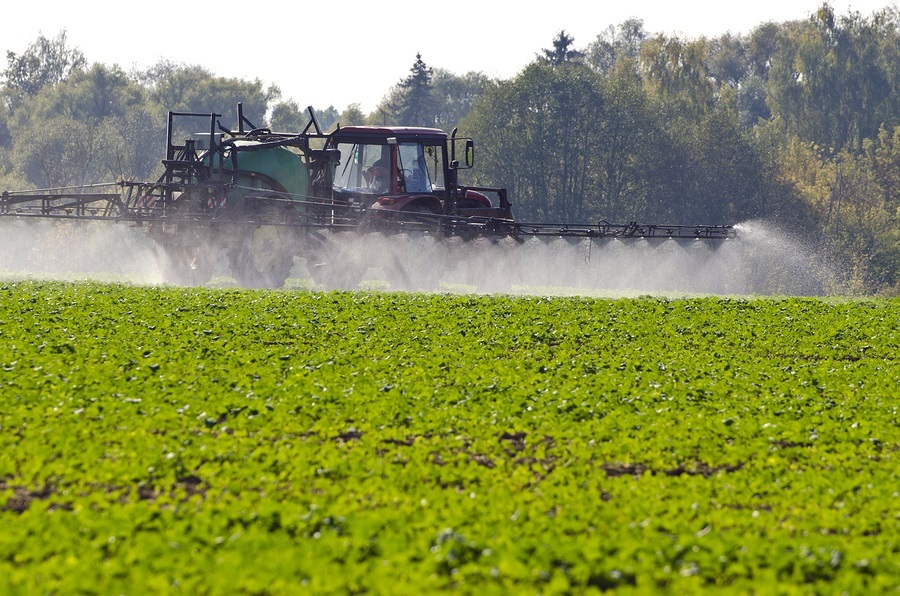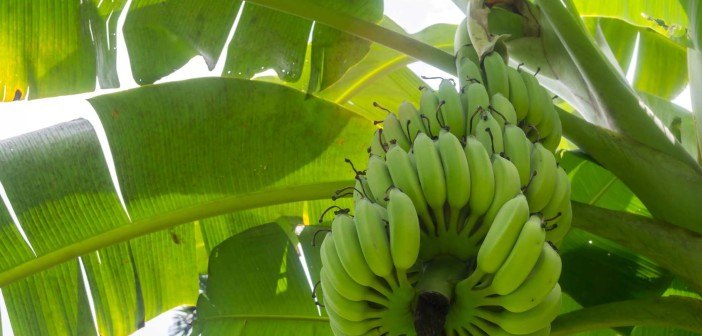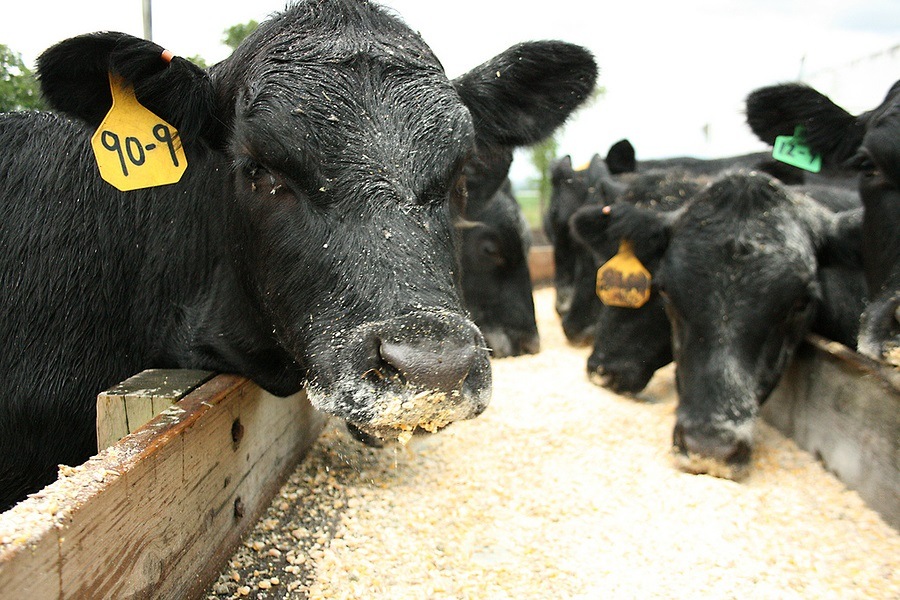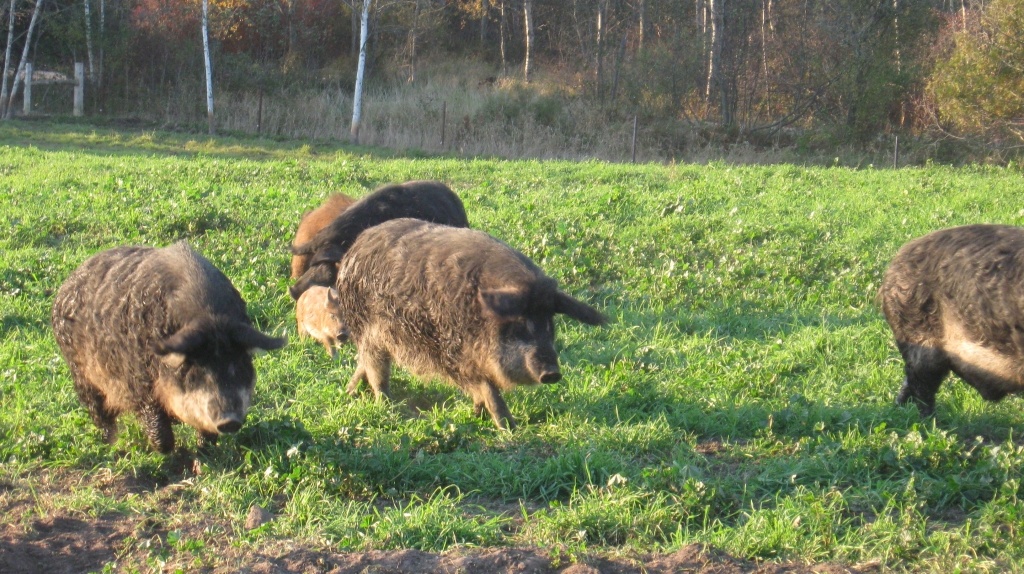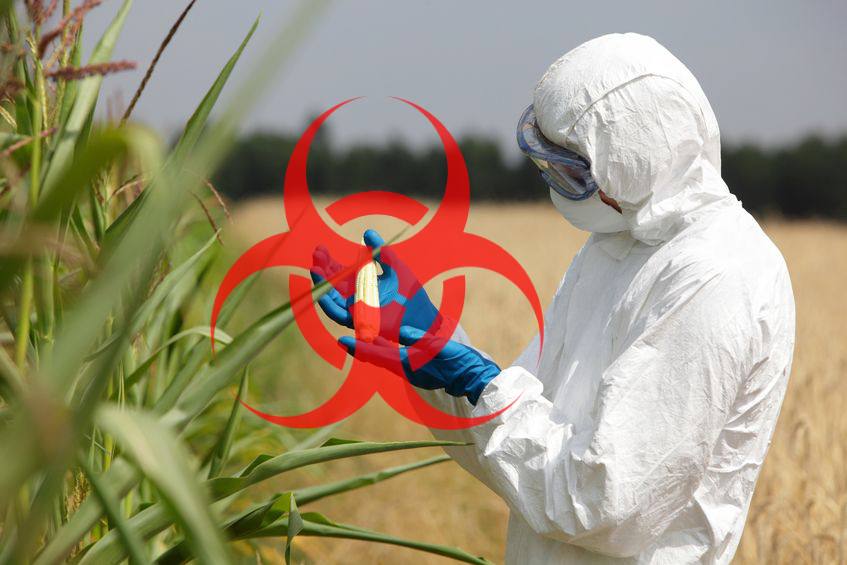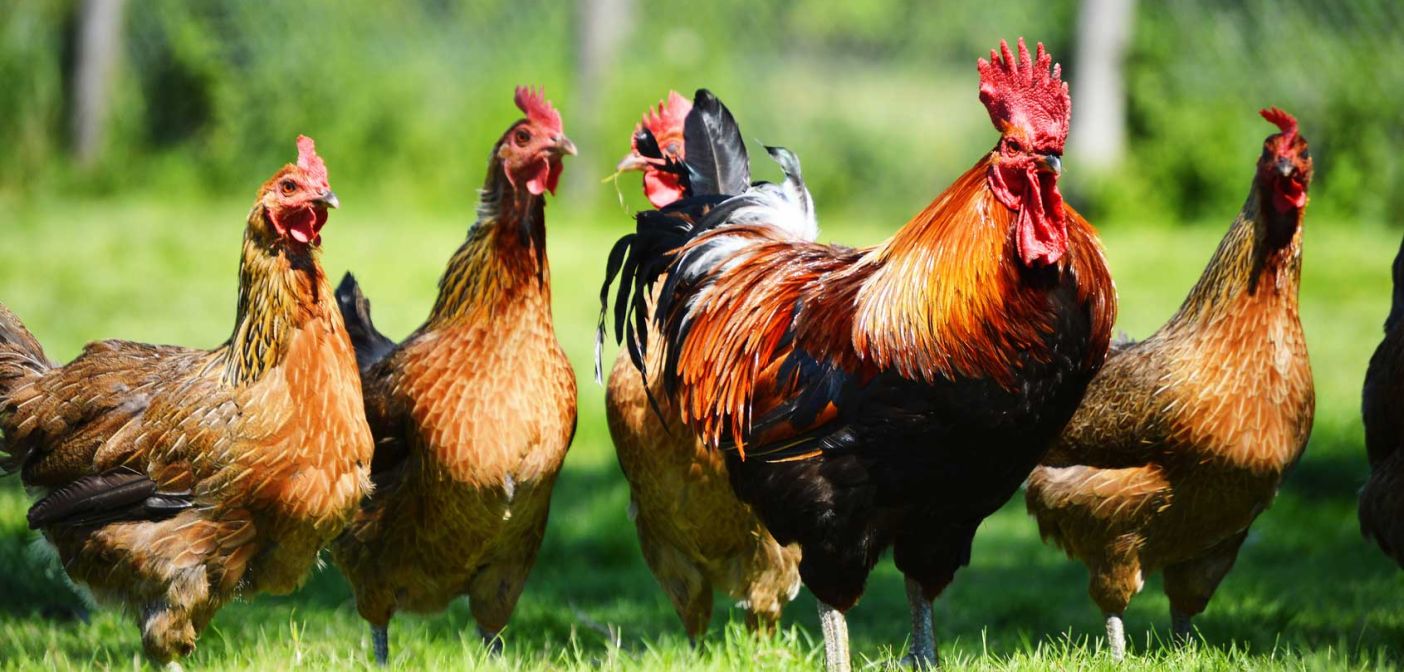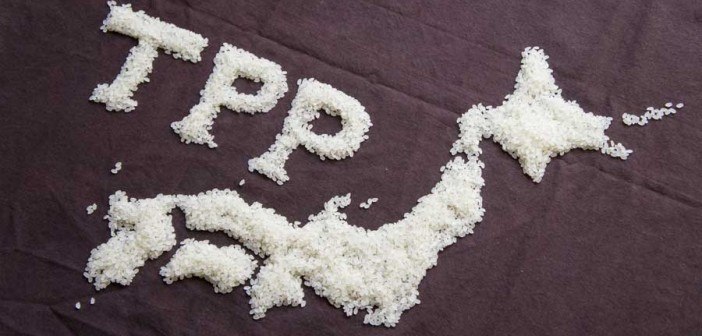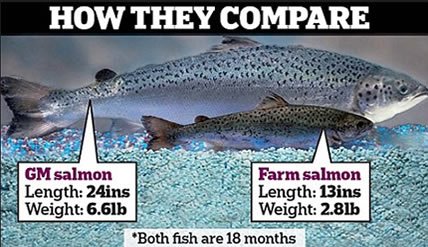News regarding the dangers of GMOs and biotech, and the advantages of organic sustainable agriculture.
Almost all American Grains Are Contaminated with Glyphosate Herbicide
Glyphosate, the main ingredient in Monsanto’s Roundup herbicide, is recognized as the world’s most widely used weed killer. What is not so well known is that farmers also use glyphosate on crops such as wheat, oats, edible beans and other crops right before harvest, raising concerns that the herbicide could get into food products. According to Tom Ehrhardt, co-owner of Minnesota-based Albert Lea Seeds, sourcing grains not desiccated with glyphosate prior to harvest is a challenge. “I have talked with millers of conventionally produced grain and they all agree it’s very difficult to source oats, wheat, flax and triticale, which have not been sprayed with glyphosate prior to harvest,” he said. “It’s a ‘don’t ask, don’t tell policy’ in the industry.” “Can you imagine the public’s response if they knew that glyphosate is being sprayed on the oats in their Cheerios only weeks before it is manufactured?” Ehrhardt asked.
Americans At Greater Risk Of Glyphosate Exposure Than Europeans
Americans are more likely than Europeans to be exposed to Monsanto’s glyphosate weed killer. That’s in large part because the U.S. Environmental Protection Agency’s calculations to determine allowable levels of glyphosate use are much more lax than the European Union’s. And American growers spray a lot of glyphosate. As Dr. Charles Benbrook points out in his paper, Monsanto’s genetically engineered Roundup Ready crops made it possible for growers to spray glyphosate more often – and almost up to harvest time. That leaves more of the weed killer’s residues on the crops. Moreover, ever since genetically engineered crops came on the market and drove up the use of Roundup, the EPA has been ratcheting up the allowable levels of glyphosate residue for certain crops.
59 Indigenous Corn Varieties at Risk as Monsanto Eyes Mexico
Mexico’s unique and treasured native corn varieties could be under threat as Monsanto, the world’s largest seed producer, vies to plant genetically modified (GMO) corn in the country. In August 2015, a Mexican judged overturned a September 2013 ban on GMO corn, thus opening more business opportunities for Monsanto and other agribusinesses pending favorable later court decisions. Monsanto even announced in October 2015 that it was seeking to double its sales in the country over the next five years. The GMO corn ban remains pending a ruling on the appeal, but a final decision could end up in Mexico’s supreme court.
Russia Bans all Imports of US Soybeans and Corn over Microbial and GMO Contamination
Russia has dealt a huge blow to U.S. farmers, after banning all imports of U.S. soybeans and corn due to microbial and GMO contamination, the country’s food safety regulator Rosselkhoznadzor announced earlier in February.
Iowa State University to Pay Students $900 to Eat Experimental GMO Bananas
Iowa State University researchers are moving ahead with a long-delayed project in which a dozen students will be paid to eat one genetically modified banana each. Earlier this week, activists delivered petitions calling on the project’s halt to university officials and the Bill and Melinda Gates Foundation, which is funding the project. The activists said more than 57,000 people signed the petition. “ISU students are being asked to be the first to consume a product of unknown safety,” the activists said in a prepared statement. “The study is not being conducted in a transparent manner, and concerned ISU community members have not been able to receive answers about the research design, risks, nature of the informed consent given by the subjects and the generalizability of the study.” The trial is expected to take place sometime this year.
New Study: GMO Crop Contamination Spreading
A recent USDA report acknowledging the spread of genetically engineered alfalfa into the wild is just further proof of what natural health advocates have known for a long time: that genetically engineered crops cannot “coexist” with traditional, organic agriculture. The report details the findings of a USDA team that analyzed three areas where alfalfa is grown: California, Idaho, and Washington. Of the over 400 areas the researchers studied, over a quarter (27%) contained GE alfalfa with Monsanto’s Roundup Ready-resistant gene. The study’s results stated that “transgenic [GE] plants could spread transgenes to neighboring feral plants, and potentially to neighboring non-GE fields.” This should come as no surprise. The problem is getting worse. Farmers in Oregon, fighting for a bill that would allow local governments to regulate crops and seeds, recently told legislators that contamination leads to real financial losses: “We lose money when we have a GMO contamination event, which I’ve had happen twice. We lose money directly, as have other growers,” said one organic farmer at a committee hearing.
FDA to Finally Start Testing for Glyphosate Herbicide in American Food
The United States Department of Agriculture (USDA) and the Food and Drug Administration (FDA) are the two federal agencies in the United States responsible for protecting consumer rights in regards to food safety. Millions of dollars of U.S. taxpayer funds are spent on testing foods annually to monitor the presence of pesticides and herbicides in the nation's food supply. However, the most commonly used herbicide which is sprayed on to genetically modified crops is routinely not tested. Glyphosate, the main ingredient used in Roundup Ready, is the most common herbicide in the world, sprayed on many billions of acres of crops each year. Neither the FDA nor the USDA routinely test for the presence of this herbicide in the nation's food. That is apparently about to change. Civil Eats is reporting that the FDA will now start testing certain foods for the presence of glyphosate.
Study: GMO Corn Shown to be Hazardous to Health of Farm Animals
In 1997, Gottfried Glöckner, an award-winning dairy farmer in Germany, became the first farmer to grow and feed Bt176 corn to his prized Holstein cows. The test continued until 2002. According to Séralini, this was the longest running and most detailed observation of farm animals ever performed for a GE crop. Since 1986, when Glöckner took over the farm, he’d had no cases of serious disease on his farm. That all changed once he started feeding his cows Bt176 in 1997. As Glöckner increased the amount of Bt176 corn in the cows’ feed, gradually going from 2 to 40 percent over the course of two years, the worse his cows fared. At the outset, 70 percent of his cows produced high yields of milk, which is considered normal. Once the GMO content of the feed reached 40 percent, a mere 40 percent of his cows were high-yielding. In 2000, milk tested positive for the Bt176 DNA specific fragment, which under European law meant the milk had to be labeled as coming from GE-fed animals. Peak mortality was reached in 2002, when 10 percent of his cows died after suffering a long period of partial paralysis. Thirty percent of the herd was sick with a variety of ailments.
Tropical Traditions Increases Healthy Traditions Product Line: Emphasizing GMO and Glyphosate-tested Products
2016 looks to be a very promising year for our new Healthy Traditions product line. In late 2015, Tropical Traditions stopped carrying the USDA certified organic seal on all of their own products. Replacing the USDA organic standards is a new, more rigorous standard of classifying the types of products Tropical Traditions sells to the public. It is not a new standard for Tropical Traditions, as the new logos and product standards implemented reflect our values and quality of food that we have offered to the public since we started selling products in the United States in 2002. We made the decision to not continue certifying our products as USDA Organic late in 2014, when we discovered that most of the USDA Organic grains we were selling to our customers had residue amounts of glyphosate, the active ingredient in popular herbicides, the most well-known being Round-up, the #1 herbicide in the world. Tropical Traditions has a ZERO tolerance level for GMOs, herbicides, and pesticides, and since the USDA National Organic Program (NOP) allows small residue amounts of pesticides and herbicides approved by the EPA for conventional crops to be present in USDA Organic certified products, we knew that we had to develop our own standards to both use in purchasing products directly from producers, as well as to educate our consumers on our own values and standards.
Bakers Green Acres Farm to Stay Open as Place for Veterans to Rebuild Their Lives after War
In a turn of events, Bakers Green Acres farm owner Mark Baker announced last week that he and his family have decided not to sell their farm as previously announced but instead they will transition from production to education. They plan to focus on veteran rehabilitation, using the farm as a place for veterans to come and live, build skills and heal. Mark, a veteran who served for 20 years, says of the recent decision to keep their farm, "We started that process [to sell our farm] and as we went down that road I realized, for a lot of reasons, that it wasn't the best thing to do. For a lot of us. Not just me, and not just my family but there's other people involved as well. I got a lot of input about it. Some of it was heart wrenching, about closing this down." Mark looks to the future saying, "We will stand and change our focus from production farming to transitioning farming for veterans, their friends, their families and associates. Is there room for you in this if you're not a veteran? Absolutely. Absolutely. These are the people you need to wrap your arms around because they're the ones that said, 'I will stand in the gap for you. No matter what I will give my life for you.' I sat with several of them this weekend and I couldn't believe that I've been in the business of chasing dollars for the last ten years when I could have been taking care of them. I can't believe where I was with that but I believe possibly I needed to get some of this training that I've gotten in the last few years in order to do this. That's the direction that I'm going, if anybody wants to come with me, please come along. ...anyone can farm."
Jackson County Oregon Farmers Win Battle for GMO-free Zone
Jackson County, Oregon, has just joined the small but growing ranks of “GE-free zones” in the U.S., which prohibit the cultivation of genetically engineered (GE) crops. It’s at least the eighth county in the country to create such an ordinance, and efforts are springing up to pass similar measures in other places. The Jackson County designation was made final on Dec. 22, when a federal judge approved a consent decree protecting the zone.
Bananas as We Know Them May Be Disappearing – The Push for GMO Bananas
They’re being decimated by an incurable fungus. Some scientists think they have an answer—genetic engineering—but will it be tasteless “frankenfruit”? When most people speak of bananas, they’re thinking of a single variety—the yellow Cavendish banana found in almost all grocery stores. But the popularity of this banana has made it susceptible to a fungal disease known as Tropical Race 4 (TR4), which is quickly spreading across the globe and is likely to hit South America, where 80% of Cavendish bananas are grown. The effort to quarantine fungus-ridden plants has largely failed, so researchers are exploring other options. Fortunately, other banana varieties still exist and are often much more flavorful than the Cavendish. Keep in mind also that in nature, flavor is often closely associated with nutritional value. It is no coincidence that the Cavendish, selected for ease of transport and sale, not taste, is often both tasteless and low in nutrition.
Michigan DNR Forces Closure of Family-run Heritage Hog Farm
Mark and Jill Baker of Bakers Green Acres have announced they are closing and selling their 80 acre family farm in Northern Michigan. Their markets for their Mangalitsa Hogs have been "roadblocked at every corner," according to Mark. Mark says, "There are entities that are working behind the scene that are destroying our market and really running very negative campaigns against us. We're just a family farm. They're spending far more money to do it than we would ever make." Now Mark, a retired U.S. veteran, must seek other means of income and way of life for his family of eleven.
State of Michigan Threatens Family Hog Farmer and Veteran Who Stood Up for his Rights
Michigan pig farmer Mark Baker got some strange holiday greetings from his state’s Department of Natural Resources late last week: a search warrant, served by regulators accompanied by state police. The warrant apparently had to do with a packaging issue discovered with one customer using Baker’s pork–a pretty severe action for one possible packaging problem. This latest escapade by Michigan authorities is merely their latest effort to make life in Michigan a hell on earth for farmer and U.S. Air Force vet Baker. The state has been after him for the last four years for having the gall to want to raise pigs it considers feral, and illegal. When Baker in 2013 got a judge to uphold Baker’s right to raise his pigs his way, the state wasn’t pleased. In fact, in a direct courtroom confrontation with pig farmer Mark Baker, recorded on video, assistant attorney general Hal Martin told Baker, “You don’t get it, do you?” As I pointed out in a 2014 blog post, what Martin meant was this: You don’t get it that we have absolute power over you. Michigan has merely been keeping its word. These regulators are good at imitating the Mafia, and carrying out threats.
Glyphosate: Pathways to Modern Diseases
Glyphosate is the active ingredient in the pervasive herbicide, Roundup. Its usage on crops to control weeds in the United States and elsewhere has increased dramatically in the past two decades. The increase is driven by the increase over the same time period in the use of genetically modified (GM) crops, the widespread emergence of glyphosate-resistant weeds among the GM crops (necessitating ever-higher doses to achieve the same herbicidal effect), as well as the increased adoption of glyphosate as a desiccating agent just before harvest. GM crops include corn, soy, canola (rapeseed), and sugar beet. Crop desiccation by glyphosate includes application to non-GM crops such as dried peas, beans, and lentils. It should be noted that the use of glyphosate for pre-harvest staging for perennial weed control is now a major crop management strategy. The increase in glyphosate usage in the United States is extremely well correlated with the concurrent increase in the incidence and/or death rate of multiple diseases, including several cancers. These include thyroid cancer, liver cancer, bladder cancer, pancreatic cancer, kidney cancer, and myeloid leukemia. The World Health Organization (WHO) revised its assessment of glyphosate's carcinogenic potential in March 2015, relabeling it as a "probable carcinogen."
GMO Chicken that Produces Drugs in Eggs Approved
The floodgates are open for more genetically modified animals—possibly even humans. Last week saw the approval of another genetically modified animal— this time a chicken genetically altered to produce a drug in its eggs. The drug is designed to replace a faulty enzyme in people with a rare genetic condition that prevents the body from breaking down fatty molecules in cells. This is the stuff of dystopian science fiction stories, and we may be approaching such a world faster than we think.
Chief Medical Officer of Health Dr. Eilish Cleary Put on Leave After Revealing Toxicity of Glyphosate Herbicide
New Brunswick's chief medical officer of health was working on a study of the controversial herbicide glyphosate when she was put on leave, CBC News has learned. Dr. Eilish Cleary wrote to a Kent County resident in August that her office would be "developing a plan to further explore" the herbicide, which is used in New Brunswick by forestry company J.D. Irving Ltd. and by NB Power. Cleary confirmed in an email to CBC News Wednesday that "This is not a situation where I requested a personal leave." She said she was not allowed to discuss the reasons for the leave.
Trans-Pacific Partnership Undermines Safety of Food Supply – Gives Power to Biotech Monopoly
A few weeks ago, the full text of the Trans-Pacific Partnership (TPP) trade deal was finally released after many years of closed-door negotiations between officials from the US and eleven other countries, all of whom border the Pacific Ocean. Its provisions were apparently kept secret from all but the biotech and pharmaceutical industries. Details of the long-secret Trans-Pacific Partnership are public at last: it will undermine the safety of our food supply, make medicine more expensive, and give power to the biotech monopoly.
“Agent Orange” Herbicide Pulled by EPA
After initially receiving the agency’s rubber stamp, a dangerous pesticide has been removed, at least temporarily, from the market. Following a lawsuit filed by a coalition of groups led by the Center for Food Safety and Earthjustice, the Environmental Protection Agency (EPA) has stated that it is revoking the registration of Enlist Duo, a combination of glyphosate and 2,4-D. Approved a year ago by the agency, Enlist Duo was created by Dow Agrosciences for use on the next generation of GMO crops. The basis of the legal challenge was that, in approving Enlist Duo, the EPA had failed to consider the impact of the herbicide on threatened and endangered plants and animals protected under the Endangered Species Act, which requires that agencies consider the impact their actions will have on endangered species.
Obama FDA Approves GMO Salmon
The FDA just approved GMO salmon, the first genetically engineered animal for direct human consumption. This approval was flawed, irresponsible and most likely illegal. Once again the FDA relied only on industry-funded studies provided by Aquabounty, the entity that will profit most from its approval. The science was so shoddy that they used sample sizes so small that they have no scientific credibility, with only 12 fish tested for one study, while another study on possible allergic reactions in humans involved only 6 fish! Despite this shoddy evidence, the Obama FDA approved AqauBounty’s GMO salmon anyway.




